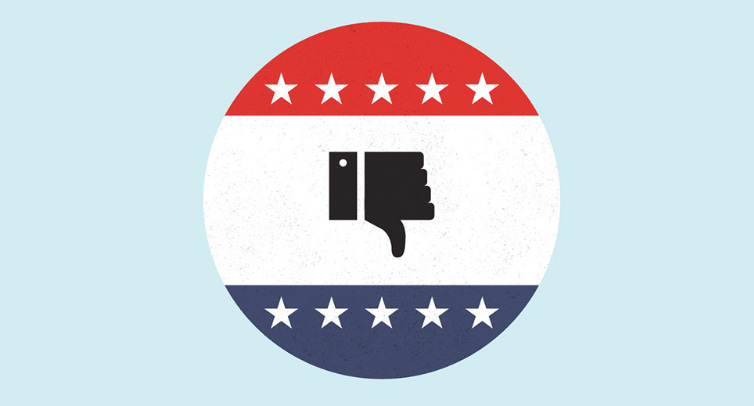Of Two Evils, Choose Neither
“Let the lie come into the world, let it even triumph. But not through me.”
Get the Self-Evident newsletter in your inbox:
Of Two Evils, Choose Neither
The last five years have been an interesting ride for me. Before Donald Trump descended the golden escalator, I had only recently finished a six-year contract in the National Guard and was a rookie cop with a very different idea of how my life was going to play out. While I definitely had political opinions and loved American history (I had studied history for two years at SUU), my identity was predominantly wrapped up in my desire to be a warrior and a guardian.
While I had engaged in politics on social media before then, I had only done so, beyond my circle of friends, under one or another pseudonym. I was a firm believer in being a consummate professional, and I didn’t want to ever jeopardize a future as a public servant for a political opinion I’d taken.
But 2016 started me down a very different path. After my initial excitement at the number of excellent Republican candidates, Donald Trump arrived on the scene and everything snowballed into hell. I had long ceased to take Trump seriously as a political figure for his birther efforts, and I was shocked and dismayed at the way his appearance seemed to drive all substantial political discussion from the picture.
I started to write. At first, probably simply to maintain my sanity while everything I understood about conservative politics crumbled around me. But even stronger than my dismay was my confusion. What on earth had happened? What was conservatism? What was the founding vision? While so many others threw down their values or principles in a rage against their political opponents, I looked for answers.
Those were the first steps in a journey that would completely change my life. Now, political philosophy is my academic field. This last summer, I even took the bold step of leaving my job as a Deputy Sheriff and engaging in my studies full-time. I’ve taken upon myself a life mission to reclaim and reassert intellectual and philosophical American conservatism, a conscious ideology that better understands the founding vision and rejects the backward notions of nationalism, populism, and angry reaction.
But the more I’ve learned, the more acutely aware I’ve become of just how lost we all are. The political dysfunction that surrounds us offers many compelling reasons to further compromise our birthright as Americans. It’s hard to stand athwart our political moment and yell, “Stop!” when it seems doing so just makes us irrelevant.
But that’s why I’ve come to echo the same idea that Jonah Goldberg and others have embraced: “Let the lie come into the world, let it even triumph. But not through me.”
Too often, we engage all of our anxieties towards the triumph of things we disagree with. So much so that we begin laying down crucial parts of what we stand for to oppose whatever it is that we fear. But I submit that such personal compromise is far more consequential than the temporary victory of that which we oppose.
Far more powerful than casting a ballot, far longer lasting than electoral victory, and far more transcendent than hashtagging the lesser of two evils into office are the power of ideas and the authority of self-evident truths.
I think it far better to channel the spirit of Cato the Younger. As I wrote earlier this year for the Federalist Coalition, Cato’s “first love was his principles, and it was to his principles he wished to leave a legacy.”
Yes, we should mourn when a lie comes into the world, we should grieve when it triumphs, and we have every good reason to concern ourselves with the future. But we can never know what the future holds. It seems to me a far better bet on the future to leave it a testimony of conviction rather than a legacy of compromise.
My decision for 2020 remains the same as it was in 2016: Of two evils, choose neither.
On Lesser Evils
I’m fully aware of what the common objection to my rejection of the lesser evils before us will be, that one or the other option isn’t actually evil. But are we actually talking about whether or not something, or someone, is evil in a real sense? Is the lesser of two evils principle really about choosing between two legitimately evil choices?
As far as I’ve always understood it, the phrase “the lesser of two evils” has always been just a figure of speech for a difficult decision between two imperfect options. And, its only real purpose is for those decisions where there really are no other options.
There are most definitely situations in life where the lesser of two evils principle must be applied. My military and law enforcement training often involved learning how to make such decisions quickly and decisively. But I cannot see very many circumstances where we should apply the principle to politics, especially when it comes to voting.
To put it bluntly, if a political moment boils down to choosing between two imperfect options, and there really is nothing else we can do, then many things have gone wrong to get us to that point. The path out of that position isn’t to comply and punctuate continued dysfunction but to deduce the needed corrective action to fix what has gone terribly wrong.
So, to say “Of two evils, choose neither” isn’t necessarily a condemnation of the two choices as actually evil, but instead a rejection of the premise that there are no other options, or that, at least, we should recognize there should be better options and that by acquiescing to poor options we’re continuing the pattern of dysfunction.
It’s to say that embracing a reality where we are robbed of the choice to support things we actually support and must choose between throwing our support behind one of two paths that do not jive with our principles isn’t embracing pragmatism and prudence; it’s an embrace of fatalism and pessimism.
Barring a truly life or death decision, the choices set before us only devolve into a choice between the lesser of two evils when we have already taken pains to justify away other options.
(But even in life or death, I tend to take the approach that Captain Kirk took towards the Kobayashi Maru. Often the answer to the no-win scenario, or the lesser-of-two-evils scenario, is simply to redefine the problem or change the parameters of the situation)
Are We Mice or Men?
Finally, I’d like to offer a final denouncement of the existential threat narratives. Both sides in this political contest have chalked up this election as “the most consequential in our lifetimes,” yet again. Both sides are claiming that the very fate of our nation hangs in the balance. Both sides think that their ways of life and their very liberty will be decided by this election’s outcome.
It doesn’t and it won’t.
As I’ve often paraphrased Hamilton, “This republic’s been a through a lot, it can take it.” While the mechanisms of our constitutional government are weakened, as I’ve written about countless times, they are far from spent. Those on the Right should take solace that Obama failed to fundamentally transform America even after eight years in office. Those on the Left should rest easy that even after four years of Donald Trump, we’re still debating the country's fate.
Further, we really need to just reject the premise that our liberties live or die in the halls of our government. Are we mice, or are we men? Can any politician really kill what burns like a fire in our hearts?
Imagine, for a moment, a scenario where America is beset by invasion in all quarters, our armed forces are in retreat, and defeat seems imminent. Even in such dire circumstances, I know more than a few Marines who, in the face of total despair, would reply, “Hey! You see this? This is a Marine and his rifle. It ain’t over.”
In similar spirit, to whatever despair might be felt in the coming days, I will reply: Hey! You see this? This is an American and his convictions. It ain’t over.
ICYMI
Check out the final batch of my “marathon-to-the election-finish-line” republications on Medium:
The Threat to the American Individual
Seizing the Means of Communication
The Persistence of Mad Kings in History and Literature
What About Limited Government?
Lesser Evils, False Dilemmas, and Cognitive Dissonance
Final Reminder: This Trump Guy Is No Reagan
Subscribe, Share, Connect
Well, I’ll see you on the other side. Be sure to subscribe, because no matter what happens…
And, please share this newsletter, add any thoughts you might have in the comments section, and be sure to connect with me on Facebook, Twitter, or Parler.
Stay Free My Friends,
-Justin




